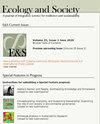Changing collaborative networks and transitions in rural sustainable development: qualitative lessons from three villages in China
IF 3.2
2区 社会学
Q1 ECOLOGY
引用次数: 0
Abstract
Promoting rural sustainable development requires improving rural systems’ self-organization to reduce dependence on external resources, which is inherently difficult in peasant economies due to low rural household income. Bottom-up collective action can help address these issues. However, few studies have examined how networks of elite and non-elite actors influence collective action and system transitions toward sustainability. This study scrutinizes the changing structures of collaborative networks in three Chinese villages through analysis of elite and non-elite actor groups and their relationships. We also examine the key elements that influence system transitions at every phase of rural sustainable development. The three case studies demonstrate that (1) elites play a vital role in the formation of collaborative networks and facilitate actor awareness; (2) spatial relationships are as essential as institutional design for successful collective action in response to sustainable development problems; (3) highly centralized collaborative networks help to improve the efficiency of the reorganization, renewal, and innovation of the village system, but the collective action outcome depends on the leadership and spatial relationships of the central actors; and (4) social memory and human capital are the most important system elements needed to exploit technology-driven windows of opportunity and achieve strong sustainability. These results provide important insights for enhancing rural systems’ capacity to self-organize and capturing windows of opportunity to achieve sustainable development.农村可持续发展中的合作网络变化与转型:来自中国三个村的定性经验
促进农村可持续发展需要改善农村系统的自组织,以减少对外部资源的依赖,而由于农村家庭收入较低,这在农民经济中是固有的困难。自下而上的集体行动可以帮助解决这些问题。然而,很少有研究考察精英和非精英行为者的网络如何影响集体行动和系统向可持续性的转变。本研究通过对精英和非精英行动者群体及其关系的分析,考察了中国三个乡村协作网络结构的变化。我们还研究了影响农村可持续发展各个阶段制度变迁的关键因素。三个案例研究表明:(1)精英在协作网络的形成和促进行动者意识方面发挥着至关重要的作用;(2)在应对可持续发展问题的成功集体行动中,空间关系与制度设计同样重要;(3)高度集中的协同网络有助于提高村制重组、更新和创新的效率,但集体行动的结果取决于中心行动者的领导力和空间关系;(4)社会记忆和人力资本是利用技术驱动的机会之窗和实现强可持续性所需的最重要的系统要素。这些结果为增强农村系统的自我组织能力和抓住实现可持续发展的机会之窗提供了重要见解。
本文章由计算机程序翻译,如有差异,请以英文原文为准。
求助全文
约1分钟内获得全文
求助全文
来源期刊

Ecology and Society
环境科学-生态学
CiteScore
6.20
自引率
4.90%
发文量
109
审稿时长
3 months
期刊介绍:
Ecology and Society is an electronic, peer-reviewed, multi-disciplinary journal devoted to the rapid dissemination of current research. Manuscript submission, peer review, and publication are all handled on the Internet. Software developed for the journal automates all clerical steps during peer review, facilitates a double-blind peer review process, and allows authors and editors to follow the progress of peer review on the Internet. As articles are accepted, they are published in an "Issue in Progress." At four month intervals the Issue-in-Progress is declared a New Issue, and subscribers receive the Table of Contents of the issue via email. Our turn-around time (submission to publication) averages around 350 days.
We encourage publication of special features. Special features are comprised of a set of manuscripts that address a single theme, and include an introductory and summary manuscript. The individual contributions are published in regular issues, and the special feature manuscripts are linked through a table of contents and announced on the journal''s main page.
The journal seeks papers that are novel, integrative and written in a way that is accessible to a wide audience that includes an array of disciplines from the natural sciences, social sciences, and the humanities concerned with the relationship between society and the life-supporting ecosystems on which human wellbeing ultimately depends.
 求助内容:
求助内容: 应助结果提醒方式:
应助结果提醒方式:


